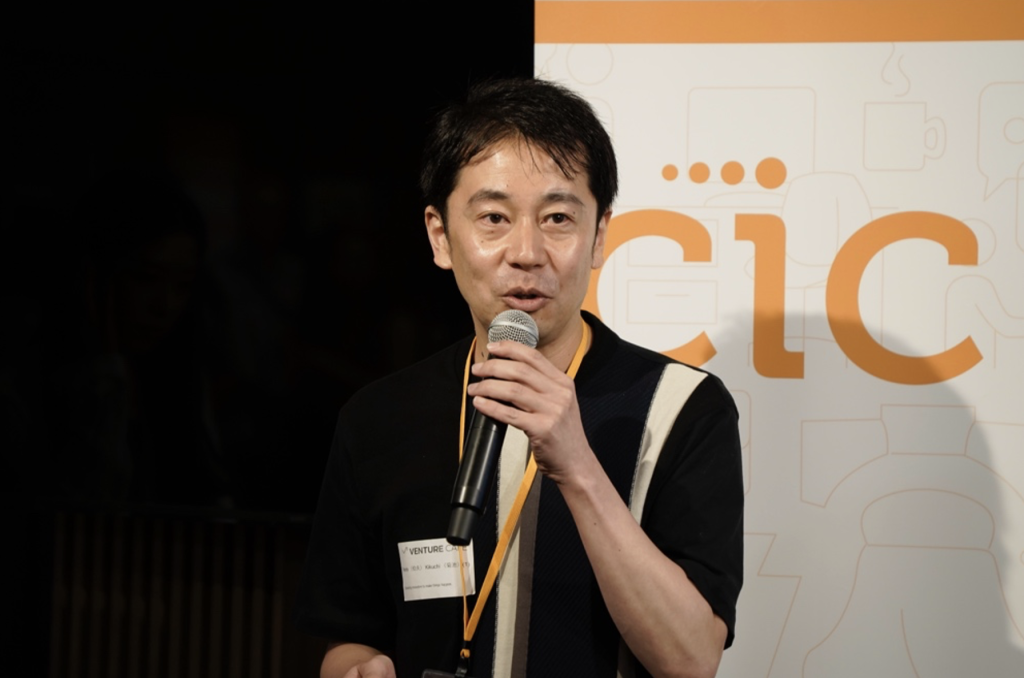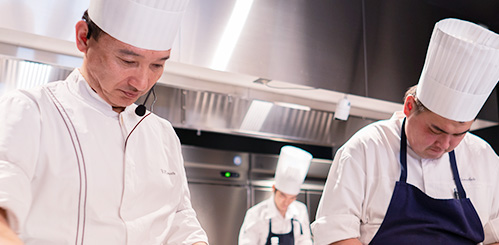[Event Report Part 2] Japan’s Food Ecosystem Leads the Way with “Interdisciplinary Innovation of Food Products and Services”@“Future Food Connect 2024” (September 12, 2024)

On September 12, 2024, the conference “Future Food Connect 2024” explored the theme of “Interdisciplinary Innovation of Food Products and Services” at Venture Café Tokyo in CIC in Toranomon Hills Business Tower. Following Part 1, we continue to report on this event in Part 2.
Pitch contest for startups solving food-related social issues
Future Food Connect 2024 also held a pitch event in collaboration with Spain’s academic institution Basque Culinary Center (BCC) and Future Food Institute (FFI) based in Italy to raise awareness and support for startups and their business.
Nine companies competed in the pitch contest for three awards including the Tokyo Food Institute Award, which came with recommended entry in the Japan round of the “Culinary Action on the Road by Basque Culinary Center” pitch to be held in Japan in November. Three judges evaluated each startup’s approach to the issue and technical capabilities in making their selection.
The winner of the Future Food Institute Award was PEEL Lab. Their solution of vegetable leather made from recycled pineapple skins responded to various issues related to animal leather including methane gas from cattle, environmental pollution during processing, an 80% waste rate, and cancer risk to people working in its processing. It is said to be one of the apparel materials that puts the greatest burdens on the environment. PEEL Lab has been providing pineapple leather to apparel manufacturers and others to solve these problems, and of 2021, their upcycling of 500 kg of pineapples has resulted in an estimated reduction of CO2 emissions by 350 tons.

One of the judges, FFI’s Masanori FUKATA explained their reason for PEEL Lab’s selection, noting, “As a new material, it holds tremendous potential. What may seem like a small idea can become a world-changing catalyst in the future. I selected this product because I could sense its potential for inspiring expanded plant-based materials in the future.”
| The winner of the Venture Café Tokyo Award was F-EAT, a startup founded at Yonezawa Campus of Yamagata University. By making full use of 3D food printing and spatial computing, the company aims to create a world that transcends conventional barriers and enables everybody to enjoy healthy and delicious meals. Some day in the future, the continued development of this technology may even make it possible for family members separated by distance to enjoy chatting over the same meal. “From a business perspective, it’s still early days, but from a medium- to long-term perspective, I think their concept could give birth to a new food culture such as never been seen before. We chose them because we were so excited by the prospect of seeing its future,” remarked judge Ryusuke KOMURA, Executive Director, Venture Café Tokyo. |

The winner of the Tokyo Food Institute Award was Quantum Flowers & Foods. They used neutrons to improve crop varieties. As ecosystems are changing due to climate change and other factors, there is global demand for new varieties. The company’s technology makes it possible to change genes by irradiating cellular DNA with neutrons. In addition to food, it is expected that this technology will also be applied in the development of industrial materials, pharmaceuticals, cosmetics, and more. TFI Representative Director Toshikazu SAWA who served as judge explained the reasons for their choice, “Last year, the startup that won an award here went on to win the BCC’s global pitch contest. All of the startups had fantastic pitches, but we chose this one because of its global impact.”

Multi-discipline “cross-talk” sessions look into the future of food from different perspectives
The theme of the first part was “A Look at the Future of Health by a Fusion of Food Company Developers and University Food Scientists” and featured Shinichi ISHIKAWA of the School of Food Science and Technology, Miyagi University and Jiro SETO of the Global Innovation Research Center, Nissin Food Holdings.
Nissin Foods’ flagship cup ramen product faces two health-related issues. The first is consumer health consciousness. Despite remarkable progress made toward improving the healthiness of cup ramen, consumers still say “cup ramen is bad for the body” and talk about how “health and deliciousness must be a trade-off.” During this session, there was discussion about how to dispel such misconceptions. The second issue related to the health of society as a whole and the environment as a whole. In response the issues of environmental destruction and child labor, Nissin is changing its sourcing and conducting research into making palm oil from yeast in order to make it sustainable. However, the limits to what corporate research can achieve alone and the necessity for co-creation with academia were mentioned.

In the second part of the “cross-talk” sessions, four experienced cooking professionals and acclaimed chefs took the stage. Serving as moderator, Mitsuru SAWADA, CEO of Chaos Inc. and successful restaurant producer moderated the panel discussion of the theme, “The chef’s workplace is not limited to the kitchen.”
Sawada sees cooking as a culture that he would like to see applied outside the kitchen. Koji Tamura of Mr. CHEESECAKE got out of the kitchen and now sells cheesecakes mainly online. Noriko Hachisuka of Mariage started out as a banker, but wound up in the world of French cuisine and now is a wine evangelist. Yuya Nakamura and Jae-ro Lee opened the restaurant INA lab in Uda City, Nara Prefecture. All these people agree with Sawada’s view. In the discussion each shared their unique perspectives and spoke about the long working hours, the future of Japanese restaurants and other challenges facing the food and beverage industry.

For the third “cross-talk” session moderated by FFI’s Masanori Fukada , the author Natsu Shimamura was joined on stage by Professor Tetsutada Suzuki (Faculty of International Studies, Toyo University and Executive Director, National Committee for the Promotion of Slow and Human-scale Urban Development) to discuss the theme of “Innovation and the Future of Society through Food ~Thoughts on Europe’s Regenerative Approach”.
Author Shimamura wrote a book titled “Slow Food” in 2000, introducing Japan to the Italian Slow Food Movement. She stressed the importance of food identity in a globalized society and the sense of crisis faced by primary industry workers in Japan.
Noting how people in modern society are busier than ever with less time for themselves as a result of accelerated innovation in pursuit of convenience, Professor Suzuki spoke of the importance of re-examining the slow lifestyle now and cited examples from around the world.
Both speakers stressed that it is precisely because is difficult to dramatically shifting the economy is so difficult, grassroots movements are important to the gradual adoption of a slow lifestyle and reduction of the burden on the environment by individuals.

The theme of the fourth talk session was “Epigenomics and the Future of Food – the Science of Diet holds the Key to longevity.” Ryu NAKAKI, CEO of Rhelixa, Ryuta TAKEDA, Executive Officer of Leave a Nest, Akiko OKADA, Director of UnlocX, and Shintaro NISHIKAWA, Director of Glocalink discussed a subject of growing global attention, the epigenome: what it is; how it works; and how it affects longevity. While genomes are the structural component of the cell that store genetic information, epigenomes are the set of genetic modifications caused over time, changes in the body, and the external environment. Until now, research has mainly been focused on diseases, but with the reduction in analytical costs in recent years, there has been an increasing research activity related to aging with a view to finding solutions to fundamentally solve aging through supplements and foods. The speakers predicted that human lifespans will continue to increase in the not-too-distant future.

In the closing talk session of this four-hour event, Toshikazu Sawa of TFI and Hirotaka Tanaka, CEO of UnlocX, took to the stage. They urged people to make the most of their time during event, commenting, “It would be a waste to just get together and exchange business cards. A topic may seem like a waste of time, but we urge you to dive into the discussion, give things a try, and really connect with the various people here. Beyond that, if you need our help with anything, please contact us and we’ll support you.” With the aim of raising awareness of startups, the Lounge with tasting booths offered event participants to try new foods, and exhibition booths, and participants and companies were engaged in deep discussions all over the venue until the very end.

TFI has numerous events planned for the future: the Japan round of the global pitch event “Culinary Action on the Road by Basque Culinary Center” to be held on November 6; Gastronomy Innovation Campus Tokyo opening in the early November and the launch of its ambitions to become a graduate school for food; and on November 25, the RegenerAction Japan 2024 conference will send out its regenerative message to the world from Tokyo. We hope you will come and visit these events as well.

Comments from the Floor of “Future Food Connect 2024”
インスピレーショントーク登壇者
これまでも当イベントに参加していましたが、今回はこれまでよりもさらに盛り上がっていて、いろんな箇所で名刺交換や会話が活発にされているのが印象的でした。
このような異業種の方が集まりネットワーキングする機会は滅多にないので、今後の開催も楽しみにしています。
Inspiration Talk Speaker
“I’ve participated in this event before, but this time, the atmosphere felt more charged with energy. I was impressed by the enthusiastic exchange of business cards and conversations taking place here and there at the event. It’s rare to have such an opportunity for people from different industries to gather and network. I’m looking forward to future events.”
Exhibitor
“It was stimulating to exhibit at this event attended by people from diverse backgrounds to see the wide array of reactions, and to respond to their questions. In addition to exhibiting, the event offered various ways to engage the people here. I felt that the talks and pitches were effective in further deepening communication.”
Event Visitor
“I work in the food industry, and was invited by a friend to participate for the first time. I was able to talk to many people I would not normally meet. It was a very meaningful experience. I came to realize that I usually approach “food” from a limited perspective. I think it was a great opportunity to broaden my horizons. Thank you very much.”




